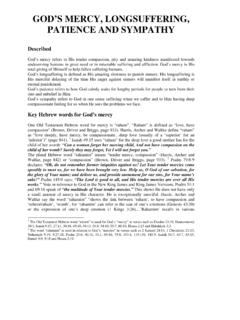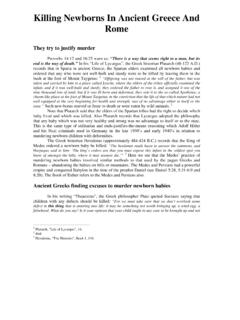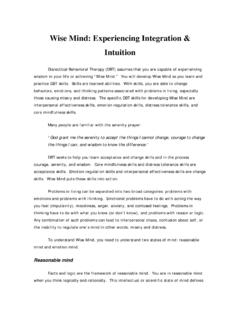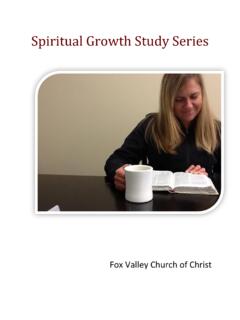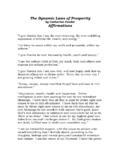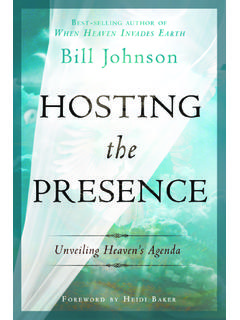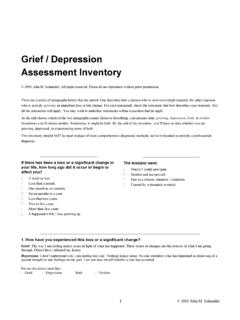Transcription of Seeking or inquiring of God - Internet Bible College
1 Seeking Or inquiring Of God The Old Testament frequently refers to people Seeking or inquiring of God. Psalm 53:2 says: God looks down from heaven upon the children of men, to see if there are any who understand, who seek God. Isaiah 55:6 states: Seek the Lord while He may be found, call upon Him while He is near. 1 Chronicles 16:11 commands: Seek the Lord and His strength; seek His face evermore! Jeremiah 29:13 states: And you will seek Me and find Me, when you search for Me with all your heart. 2 Samuel 21:1 refers to David inquiring of the Lord for supernatural guidance. A similar usage is found in Amos 9:11-12. Under the Mosaic Covenant, believers sought both the Lord and His guidance. As New Covenant believers, we should not just seek the Lord s guidance. Instead we should primarily seek Him in the sense of personally knowing Him more, knowing more about Him from His Word and experiencing His wonderful Presence by His Holy Spirit.
2 As New Covenant non-Jewish believers, we have already found God. This is even though prior to conversion, we were not Seeking Him (Isaiah 65:1 and Romans 10:20) or were Seeking Him in wrong ways (Romans 3:11). But even though we have found God and are saved, we still need to seek Him in the above post-conversion ways. In Colossians 3:1, Paul commanded born-again saved believers: If then you were raised with Christ, seek those things which are above, where Christ is, sitting at the right hand of God. In New Covenant times, God wants all humans to seek Him and find Him (Acts 15:16-17 and 17:26-27) and to seek His Kingdom rule in their lives (Luke 12:31). Seeking God for guidance is just one aspect of Seeking to know Him, to experience Him and to be ruled by Him as King. Under the Mosaic Covenant Under the Mosaic Covenant, God instructed and exhorted the Israelites to meditate repeatedly on the Scriptures (Psalm 1:1-2, 119:48, 119:148 and Deuteronomy 11:18-21).
3 This was their main means of knowing God s will. But for matters on which the Scriptures did not reveal His specific will, they often inquired of God. Under the Old or Mosaic Covenant, the two main means by which the Israelites inquired of God about matters not specifically covered in the Scriptures were through the Urim and Thummin on the ephod worn by the High Priest and through God s prophets. 1 Samuel 28:6 states: And when Saul inquired of the Lord, the Lord did not answer him, either by dreams or by Urim or by the prophets. Here we see that in Old Testament times, God sometimes answered their inquiries by dreams also. Exodus 18:15, 1 Samuel 9:9, 1 Kings 22:7, 2 Kings 3:11 and 8:8 speak of inquiring of God through God s prophets. Under the Mosaic Covenant, God also spoke at different times through angels (see Genesis 19:1-17), His audible voice (Exodus 3:1-6), visions (see Genesis 46:2) and miraculous signs in circumstances (1 Samuel 10:1-9 and Jeremiah 32:6-8).
4 He guided as well through a pillar of cloud by day and a pillar of fire by night (Exodus 13:21-22 and Numbers 14:14). But mostly, He spoke to ordinary people through the Urim and Thummin and through His prophets. Under the New Covenant In New Covenant times, all believers have the Holy Spirit (1 Corinthians 3:16, 6:19 and 1 John 4:13). Verses such as John 14:26, 16:13 and 1 John 2:27 reveal that the Holy Spirit Himself is the main guide for New Covenant believers. When Jesus Christ began to operate as our High Priest, the Old Covenant High priesthood finished (Hebrews 7:11-8:6). Therefore, believers can no longer go to the Israelite High Priest to inquire of God. Also, the New Testament does not record examples of New Covenant believers purposely going to prophets to inquire of God. Instead New Covenant prophets are one means by which sometimes God confirms guidance that He has already been speaking to us by His Holy Spirit (compare Acts 20:20-23 to Acts 21:10-13).
5 In the following, I am going to refer often to various Israelites living under the Mosaic Covenant inquiring of God through the High Priests Urim or Thummin or through His prophets. By this, I am not teaching that New Covenant believers should go to a Jewish High Priest or to a prophet of God to seek His guidance. Such things are for the Old or Mosaic Covenant only. The New Testament does not teach that New Covenant believers should seek God s guidance in these Mosaic Covenant ways. So note I am using these Old Covenant examples to illustrate some Biblical principles which apply under all covenants and not to lead you to seek certain types of guidance which apply only under the Mosaic Covenant. David s Approach to inquiring of God Frequently, the Old Testament records that godly King David inquired of the Lord for guidance (1 Samuel 22:10, 22:15, 23:2, 23:4, 23:9-12, 30:7-8, 2 Samuel 2:1, 5:19, 5:23, 21:1, 1 Chronicles 13:1-3, 14:10 and 14:14).
6 David regarded inquiring of God as being one aspect of the most important thing in his life. He said in Psalm 27:4: One thing I have desired of the Lord, that I will seek: That I may dwell in the house of the Lord all the days of my life, to behold the beauty of the Lord, and to inquire in His temple. Not Bothering to Inquire of God King Saul was different from David. 1 Chronicles 10:13-14 records that one of the reasons God had Saul put to death and handed his kingdom to David was because Saul did not inquire of Him: So Saul died for his unfaithfulness which he had committed against the Lord, because he did not keep the word of the Lord, and also because he consulted a medium for guidance. But he did not inquire of the Lord; therefore He killed him, and turned the kingdom over to David the son of Jesse. Read 1 Samuel 13:1-14 and 15:1-31 to see how Saul continually resorted to mere human reasoning in major decision-making instead of inquiring of God.
7 In 1 Samuel 13:11-12, Saul uses the expressions When I said and So I felt to describe how he made a foolish decision which took him out of God s will and resulted in God instructing Samuel to prophesy that God was going to take the kingship from him. When I saw refers to physical sense observation and human reasoning. I said refers to human reasoning and So I felt refers to human emotions. Isaiah 30:1-2 reveals that the Jews at a particular time in Isaiah s life, could not be bothered inquiring of God for His counsel and plans: Woe to the rebellious children, says the Lord, Who take counsel, but not of Me, and who devise plans, but not of My Spirit, that they may add sin to sin; who walk to go down to Egypt, and have not asked My advice, to strengthen themselves in the strength of Pharaoh, and to trust in the shadow of Egypt shall be your humiliation.
8 These self-reliant Israelites made their own plans with no interest in what the Holy Spirit thought. inquiring of God for guidance does not mean we must ask for specific supernatural guidance about each small decision we make every day. But inquiring of God does refer to following the other principles in this chapter. Not inquiring in Case God Told Him Unwanted Words 2 Chronicles 18:1-7 records that sinful King Ahab did not like inquiring of prophets who would tell him unpleasant things. Ahab did not want to inquire of God unconditionally. He only wanted to hear what God would say, if it fitted in with his own self-created visions, dreams, goals and desires. The godly King Jehoshophat was different. He loved God and appreciated hearing whatever God had to say. This is even if it did not fit in with his own plans and desires. inquiring of God With Our Minds Already Decided Jeremiah 42:1-6 shows that one occasion, many Jews came to the prophet Jeremiah to inquire of God.
9 Their words in verses 3 and 5-6 make them sound unconditionally submitted to God: ..pray for us to the Lord your the Lord your God may show us the way in which we should walk and the thing we should they said to Jeremiah, Let the Lord be a true and faithful witness between us, if we do not do according to everything which the Lord your God sends us by you. Whether it is pleasing or displeasing, we will obey the voice of the Lord our God to whom we send you, that it may be well with us when we obey the voice of the Lord our God. But like some people today, these Jews did not totally mean what they were saying. So when God told them through Jeremiah to do certain things that they did not desire to do, they rejected what He said as being not from God. They had already decided beforehand what they were going to do. Jeremiah had a different heart. As revealed in verse 4 he promised to say only what God said: Then Jeremiah the prophet said to them, I have heard.
10 Indeed, I will pray to the Lord your God according to your words, and it shall be, that whatever the Lord answers you, I will declare it to you. I will keep nothing back from you. Jeremiah did not add his own dreams, visions or desires to God s plans. Observe also Jeremiah could not produce instantaneous God-given dreams, visions or revelations. Verse 7 says the guidance from the Lord came 10 days later. We cannot force God to speak exactly when we want Him to speak. We must wait on Him in patience. These Jews, who rejected the Word of the Lord through Jeremiah, worshipped God (Jeremiah 43:2). But they also venerated or worshipped the Queen of Heaven (Jeremiah 44:15-30). Jeremiah 44:15-25 reveals these superstitious Jews believed that the circumstances in their lives had been good when they had also been worshipping the Queen of Heaven previously and that it was only after they stopped doing this that great suffering had come on them.
